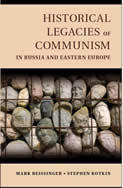
Historical Legacies of Communism in Russia and Eastern Europe
Type
This book takes stock of arguments about the historical legacies of communism that have become common within the study of Russia and East Europe more than two decades after communism’s demise and elaborates an empirical approach to the study of historical legacies revolving around relationships and mechanisms rather than correlation and outward similarities. Eleven essays by a distinguished group of scholars assess whether post-communist developments in specific areas continue to be shaped by the experience of communism, or alternatively by fundamental divergences produced before or after communism. Chapters deal with the variable impact of the communist experience on post-communist societies in such areas as: regime trajectories and democratic political values; patterns of regional and sectoral economic development; property ownership within the energy sector; the functioning of the executive branch of government, the police, and courts; the relationship of religion to the state; government language policies; and informal relationships and practices.
Contributors: Stephen Kotkin, Mark R. Beissinger, Grigore Pop-Eleches, Clifford Gaddy, Béla Greskovits, Timothy Frye, Eugene Huskey, Brian Taylor, Alexei Trochev, Anna Grzymala-Busse, Volodomyr Kulyk, Jessica Pisano

